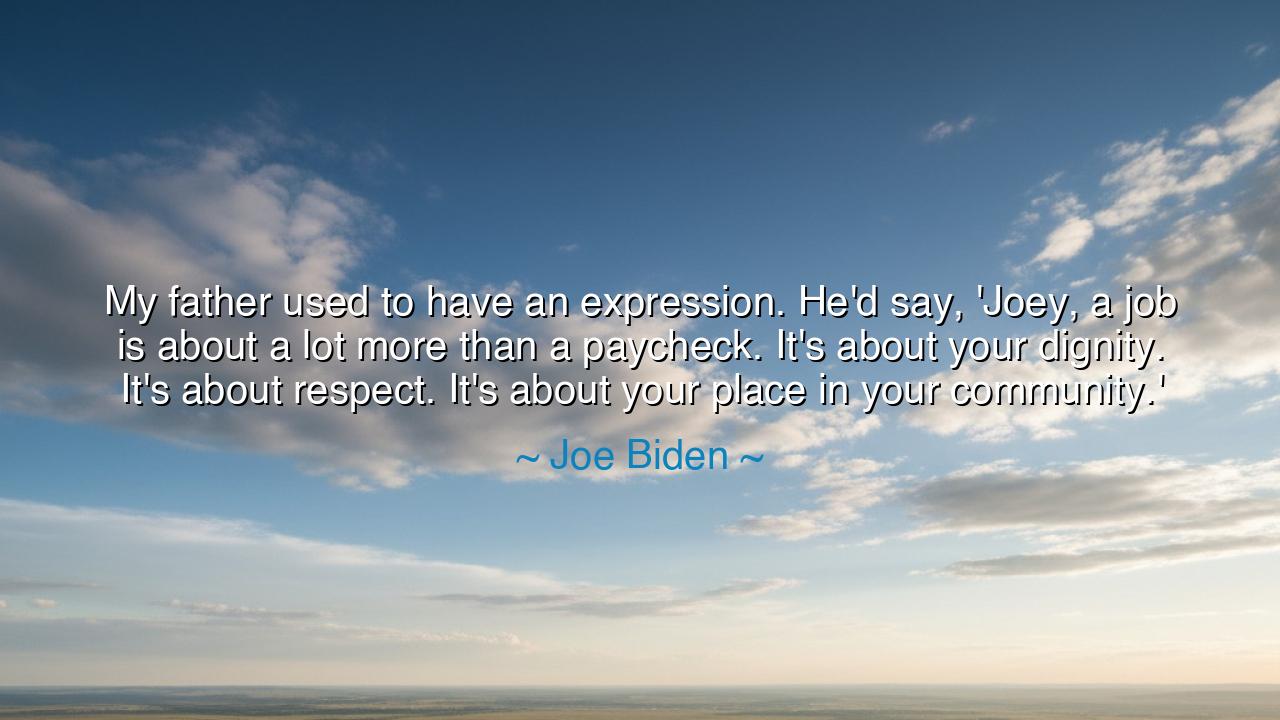
My father used to have an expression. He'd say, 'Joey, a job is
My father used to have an expression. He'd say, 'Joey, a job is about a lot more than a paycheck. It's about your dignity. It's about respect. It's about your place in your community.'






Joe Biden, recalling the wisdom of his father, once spoke these words: “My father used to have an expression. He'd say, 'Joey, a job is about a lot more than a paycheck. It's about your dignity. It's about respect. It's about your place in your community.'” These words are not mere advice about labor; they are a declaration of the sacred nature of work. For work, rightly understood, is not only the means by which we earn bread, but the way by which we earn dignity, claim respect, and weave ourselves into the fabric of community.
The origin of this wisdom comes from the humility of working-class life. Biden’s father, who faced hardship and unemployment, knew well the pain of being without work. He understood that what is lost in such moments is not merely income, but the sense of worth and belonging that comes from contributing to something larger than oneself. His teaching to his son reflects the ancient truth that human beings are not sustained by bread alone, but by purpose, by honor, and by the recognition of one’s place among others.
The ancients, too, honored this principle. In Rome, labor was seen not only as toil but as service to the republic, a way of proving one’s loyalty to the common good. In Greece, the farmer, the craftsman, and the soldier were all esteemed for the roles they played in sustaining the polis. The Hebrew scriptures declare that “the laborer is worthy of his hire,” not simply for his wage, but because his work reflects the dignity of creation itself. Thus, in every tradition, work is bound to identity, to honor, and to community.
History offers us shining examples. Consider the coal miners of Appalachia, who descended each day into the dark belly of the earth. Their wages were meager, their labor perilous, yet what they sought was not only survival but respect—the acknowledgment that their work fueled the homes and industries of a nation. When they organized for safer conditions and fair treatment, they were not merely demanding more money; they were demanding their dignity, their rightful place as men who bore the weight of the world on their shoulders. Their struggle reflects Biden’s father’s truth: a job is about more than a paycheck.
The lesson here is clear: when work is stripped of respect, men and women are reduced to machines; when it is honored, they stand tall as human beings. Dignity in labor is the foundation of justice, for without it, wages cannot feed the soul, even if they feed the body. Every society must therefore value not only the wealth produced by work, but the humanity of the worker. To ignore this is to invite despair, alienation, and the decay of community itself.
Practical actions flow from this wisdom. Whatever your station, treat your work as more than a transaction. Seek to do it with integrity, for in integrity lies dignity. Honor the work of others, whether it is humble or exalted, for each role sustains the community. If you are a leader, remember that fair treatment and recognition matter as much as pay, for they uphold the spirit of those who labor. And if you face hardship, remember that your worth is not measured by wealth, but by the respect and service you bring to the lives of others.
Thus, O listeners, take to heart the wisdom of a father passed to his son: “A job is about a lot more than a paycheck. It's about your dignity. It's about respect. It's about your place in your community.” These words are not only for one family but for all who labor. For work is not just survival—it is the stage upon which honor, belonging, and respect are won.
And remember this eternal truth: wages sustain the body, but dignity sustains the soul. Work not only for money, but for meaning. Respect not only what you earn, but what you become. And in honoring your labor, you will honor your place among the community of mankind.






AAdministratorAdministrator
Welcome, honored guests. Please leave a comment, we will respond soon